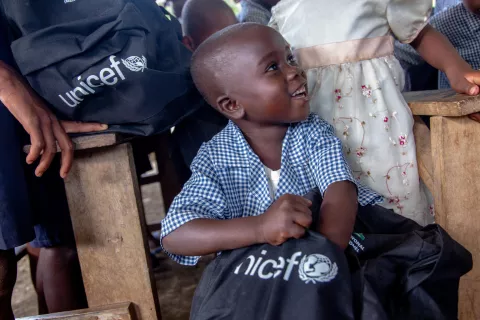Mothers fight malnutrition in Burkina Faso, one child at a time
Mother-to-mother support groups help keep children healthy in region with high prevalence of stunting

A group of mothers in Yako, Burkina Faso, are working hard to ensure their children survive and thrive – and are changing hearts and minds, in the process.
YAKO, Burkina Faso, 8 November 2017 – In Yako, in Burkina Faso’s Northern Province, Awa slowly approaches the group of women, her twin toddlers draped one in front and one behind.
Awa settles herself. She’s been looking forward to the meeting. There was a time when she was afraid she might not give her babies what they needed – her first children, and two at once – but she has had much support from this group.

Talking nutrition
Northern Province has a high prevalence of stunting among children under 5, according to WHO standards. Stunting, particularly during the first 1,000 days of a child’s life, can have very serious long-term effects, including impaired cognitive development, a lower IQ, a weakened immune system and, later in life, greater risk of such diseases as diabetes and cancer.
Awa’s mother-to-mother support group, organized by local NGO Association Solidarité et Entraide Mutuelle au Sahel (SEMUS) in partnership with UNICEF, is one way to help mothers like her avoid the trap of stunting. Awa joined when she was three months pregnant.
As Awa settles the twins, a community health worker is talking about food diversity. The group meet on a monthly basis to work on topics related to nutrition. Today’s topic is complementary feeding.
Awa listens carefully and answers the questions the health worker asks. Like Awa, the mothers are here to make sure that they are providing their children with the best nutrition possible, and practising good hygiene, so the children will have the best start in life.
Nurturing Sakinatou and Abdoul Latif
The practices she has learned through the group have helped Awa’s children thrive, but it has not always been easy. She married into a polygamous family when she was 20 years old and, when she gave birth, had pressure from her new family on how to nurture the babies.
“My mother-in-law was insisting on giving infusions and water to my children,” she says, “but the community health worker taught us the importance of exclusive breastfeeding until the age of six months.”
With the learning from the group, Awa did her best to breastfeed the twins exclusively.
But feeding the babies wasn’t without its own challenges. Abdoul wasn’t willing to take her breast as often as Sakinatou. Awa says her family’s pressure made breastfeeding even more difficult; her mother-in-law would taunt her when she would breastfeed the babies: “You were given water when you were born, and here you stand, alive and married to my son.”

A family breaks the cycle
After the meeting has ended, Awa brings us to her family’s home. We drive across dry, hot lands on which nothing seems to grow.
Awa’s mother-in-law sits in front of the door, surrounded by her grandchildren. Awa greets her and enquires about her health, and then she retreats, respectfully, listening.
It seems as though Awa’s mother’s group has had an effect on the older woman, too. “In my time, we didn’t always know what was best for our children,” she tells us. “[I]t was common to purge babies and provide them with local plants for drinking when they were born.
“Today I’m glad that Awa is seeing the community health workers and learning to feed Sakinatou and Abdoul to take good care of them,” she finishes.
Through education, mothers like Awa have the power and the tools to break the cycle of harmful traditional practices and to give a better future to their children, the next generation. One child at a time, the mothers of Yako are helping their children to survive, and to thrive.
To prevent chronic malnutrition and improve women and children’s well-being at the community level, UNICEF and partners have supported the training of 3,490 community health workers. These workers promote exclusive breastfeeding until a baby is 6 months old, sound maternal nutrition and good water, sanitation and hygiene practices, and provide such services as growth monitoring and cooking demonstrations. Through mother-to-mother support groups like Awa’s, these programmes have reached 70,642 pregnant and 166,116 lactating women.
> Learn more about children and nutrition
> Get the data


